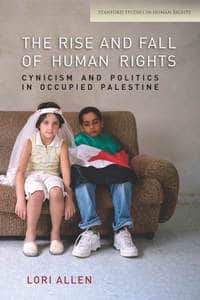When Lori Allen‘s The Rise and Fall of Human Rights: Cynicism and Politics in Occupied Palestine appeared last year, it was – of course – a book of timely importance. Few anthropologists before her had documented the decline of belief in the promises embedded in the language of human rights, caused by ongoing experiences with empty rhetoric mixed with gross injustices. Allen’s study could even be characterised as a ‘lab’ of just how and why we might be seeing the dawning ‘end of human rights‘. Yet few could have predicted just how central Allen’s book would be just a short while later due to events that no one hoped that we would see. Today we recycle Toby Kelly‘s review of Allen’s book, first published in Allegra on March, 2014.
As we enter what must be the autumn of the Arab Spring, one of the few things we can say with any certainty is that human rights claims are playing an increasingly less significant role. On the streets of Damascus and Cairo, people are finding other ways to articulate their claims for justice. If human rights are the ‘last utopia’, no one seems to have told the residents of the Middle East. Indeed, if human rights are invoked it is often with a mixture of cynicism and regret, as the apparent hypocrisy of western power is laid bare. Throughout the Egyptian revolutions and its aftermath, for example, dignity has been a central organising concept. From here you would have thought it a short step to start articulating claims in terms of human rights. Yet, this is a step that few Egyptian have been willing to take. Human rights, it seems, are simply not convincing. For four decades we have witnessed the seemingly unstoppable march of human rights, as NGOs have spread out over the globe, and human rights documents have proliferated. It has appeared at times that if any claim for justice wanted to be taken seriously, or to reach out on a global scale, it had to be expressed in the idioms of human rights. It is striking therefore that throughout the different mass movements and revolutions of the last five or six years, human rights has been far from the dominant language. The protestors in Zuccotti Park, in Athens, or Syria, have largely looked elsewhere for their inspirations. It is of course too soon to write an obituary for human rights, but it might well be that we are seeing the high watermark of the human rights revolution.
If you want to understand the rise and fall of human rights, there are few better places to look than Occupied Palestine. Ramallah, a small town with a population of less than 30,000 people, has over 20 times as many human rights organisations than the whole of Scotland.
From the 1980s, as Palestinians sought to internationalise their struggle and came to terms with the limits of armed conflict, human rights became a key rallying call. As a language of victimhood and suffering, human rights seemed to resonate nicely with Palestinian national aspirations. This only intensified in the 1990s, as the Oslo Peace Process saw international donors pump millions of dollars into the region, as part of an attempt to promote what they saw as a ‘human rights culture’. By 2014 though, if you mention the words ‘human rights’ to many Palestinians, they will at best raise their eyebrows and give a knowing smile, and at worst launch into an angry tirade about the irrelevance or dishonesty of those that speak in its name.
Lori Allen’s The Rise and Fall of Human Rights is a masterful account of the potential and limits of human rights. She describes with great sensitivity and insight why Palestinians have turned to human rights, and why so many of them have been so disappointed when they have done so. The book is written with great analytical insight and real sensitivity to the nuances of Palestinian history. Allen describes how human rights institutions, vocabularies and actors have shaped the ways in which Palestinians represent themselves to each other and the international community. The book charts the rise of human rights from the 1980s and the foundation of the first Palestinian human rights NGOs, and moves into look at the impact of the Oslo Peace Process and it associated donor interventions. Later chapters look at the ubiquity of human rights training, the ways in which the authoritarian Palestinian National Authority has used human rights to bolster its claims to power, and the adoption of human rights languages by the Islamist movement Hamas. For Allen, human rights have been central to the emerging forms of statecraft and citizenship that mark Occupied Palestine. Donor priorities in particular have distorted the national aspirations of the Palestinian people. However, the book is not so much critical of human rights as what Allen calls the ‘human rights industry’.
Over the last thirty years, human rights has become a profession for many middle class Palestinians, and and in doing so has also become both increasingly technocratic, and ever more a matter of performance and appearance, rather than struggle and resistance. Crucially though, Palestinian cynicism about human rights is not a form political nihilism. Instead, Allen describes how it creates a critical space for discussion about the restraints and possibilities of the current political structures that govern the lives of Palestinians.
Taken together, the book’s chapter captures beautifully the mixture of skepticism and despair that marks so many human rights engagements. In particular, Allen shows the ways in which a bureaucracy gives human rights a concrete presence, but also, at the same time, can empty human rights of their radical potential. The overall conclusion of the book is not that human rights should be done away with all together. Instead, Allen shows that without a broader vision of social and political justice and a sense of how this can be achieved, human rights necessarily remain an empty shell. This well written and balanced book is a must read for all those interested in the promises of human rights, in Palestine or elsewhere.
Lori Allen. 2013. The Rise and Fall of Human Rights: Cynicism and Politics in Occupied Palestine. Palo Alto: Stanford University Press. 280 pp. Pb $24.95. ISBN: 9780804784719




